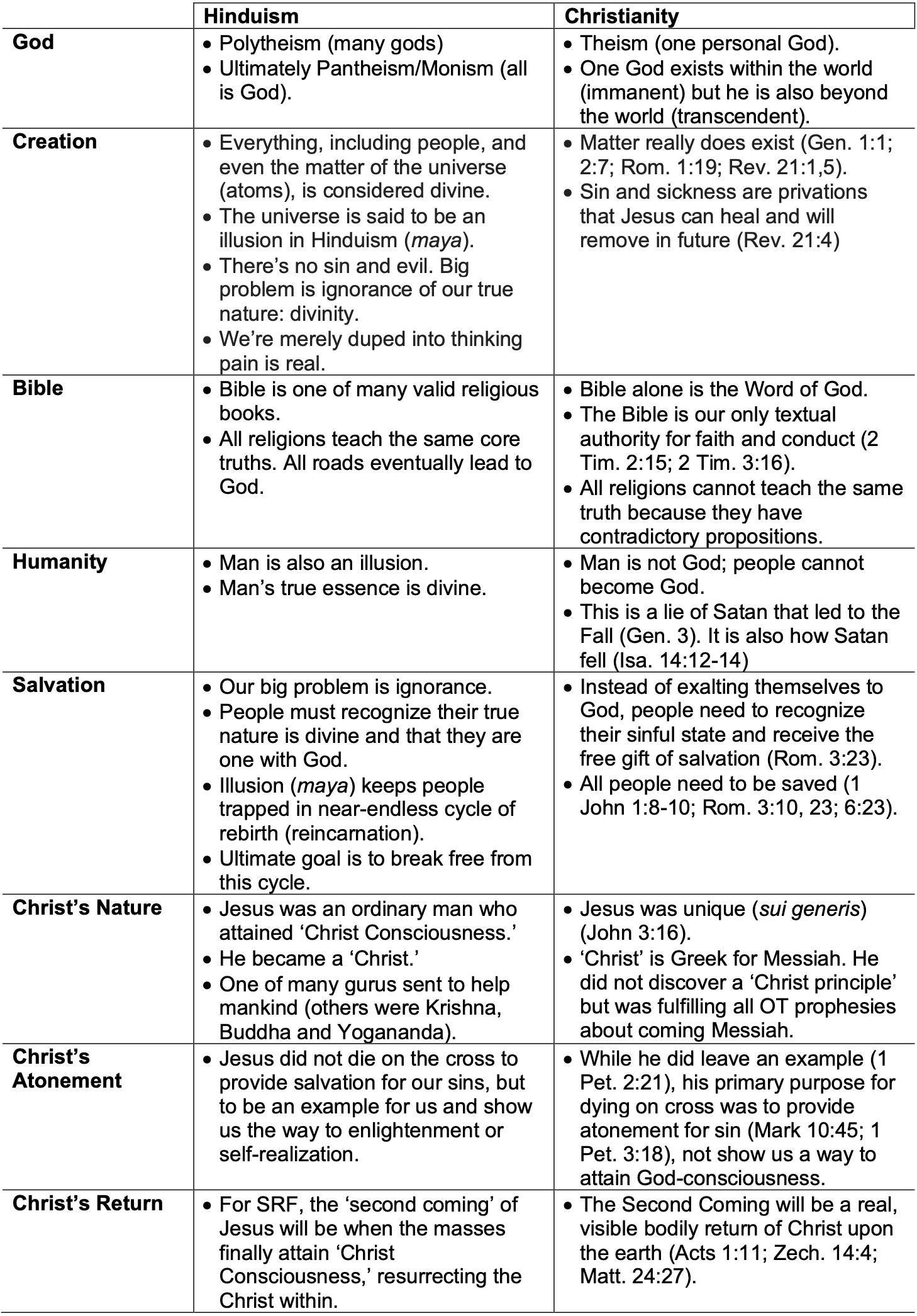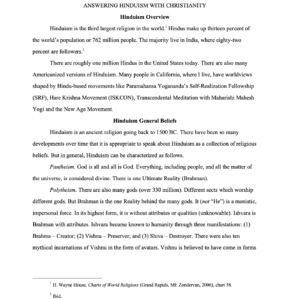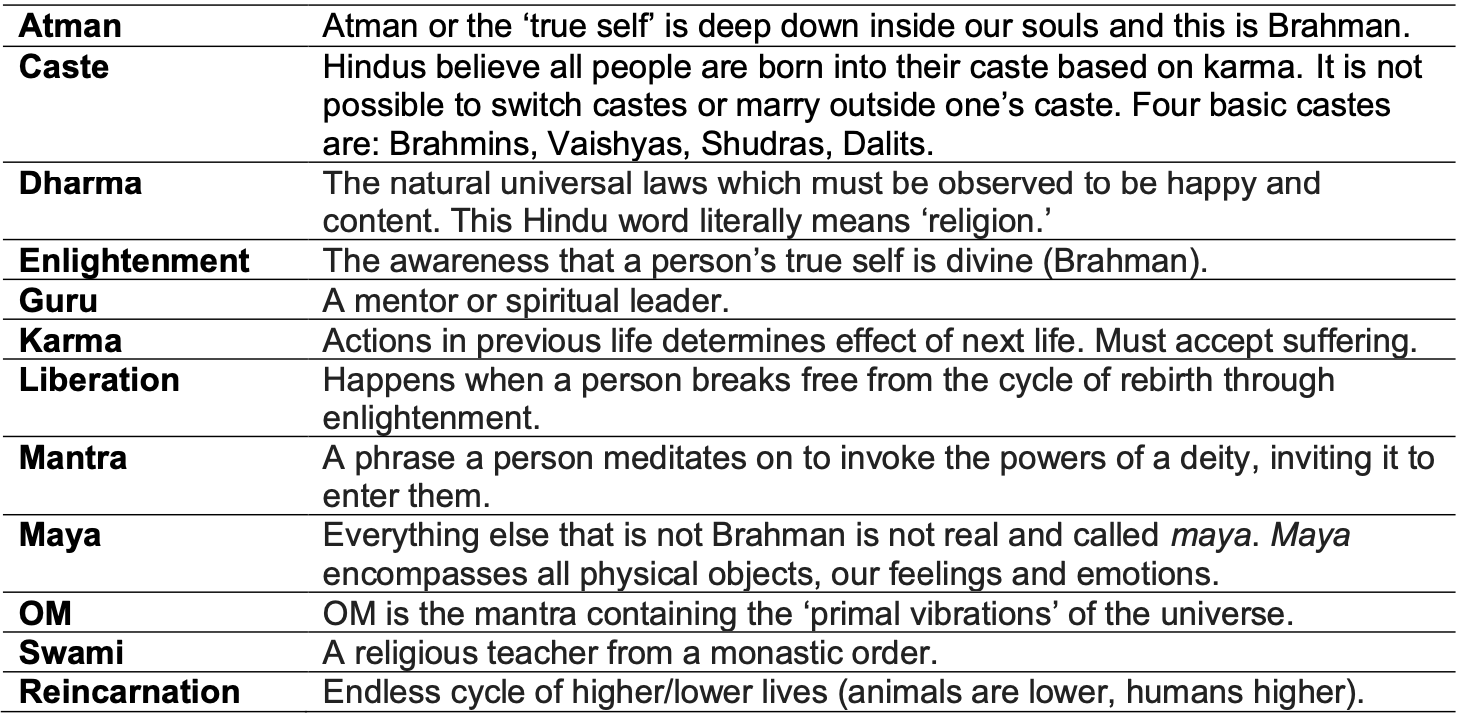Answering Hinduism with Christianity
By Shawn Nelson
January 2020
Here is an overview of the differences between Hindism and Christianity followed by a Christian response.
This paper was in partial fulfillment of the requirements for the course titled Advanced World Religions (AP904) taken at Veritas International University in January, 2020.
Copyright © 2020 Shawn Nelson.
Hinduism Overview
Hinduism is the third largest religion in the world.[1] Hindus make up thirteen percent of the world’s population or 762 million people. The majority live in India, where eighty-two percent are followers.[2]
There are roughly one million Hindus in the United States today. There are also many Americanized versions of Hinduism. Many people in California, where I live, have worldviews shaped by Hindu-based movements like Paramahansa Yogananda’s Self-Realization Fellowship (SRF), Hare Krishna Movement (ISKCON), Transcendental Meditation with Maharishi Mahesh Yogi and the New Age Movement.
Hinduism General Beliefs
Hinduism is an ancient religion going back to 1500 BC. There have been so many developments over time that it is appropriate to speak about Hinduism as a collection of religious beliefs. But in general, Hinduism can be characterized as follows.
Pantheism. God is all and all is God. Everything, including people, and all the matter of the universe, is considered divine. There is one Ultimate Reality (Brahman).
Polytheism. There are also many gods (over 330 million). Different sects worship different gods. But Brahman is the one Reality behind the many gods. It (not “He”) is a monistic, impersonal force. In its highest form, it is without attributes or qualities (unknowable). Ishvara is Brahman with attributes. Ishvara became known to humanity through three manifestations: (1) Brahma – Creator; (2) Vishnu – Preserver; and (3) Shiva – Destroyer. There were also ten mythical incarnations of Vishnu in the form of avatars. Vishnu is believed to have come in forms of a fish, turtle, boar, and people like Krisha and Buddha. The Bhagavad-Gita contains the stories of these myths.[3]
Devotion to a god or goddess. In the West, we tend to focus on the philosophy of Hinduism. But many in traditional Hinduism are devoted to a single god. This is called “The Way of Devotion” or bhakti. They look to their god or goddess for release from this world. For example, most Hindus today follow the god Shiva. Ganesha (Shiva’s son who has an elephant’s head) is another popular god.
Temple Hinduism. There are Hindu temples in just about every city of the United States now. Each temple is dedicated to one god or goddess, with others present. Hindu families have shrines at home with statues or pictures of the gods. Followers chant the names of their gods, do mantras, make offerings to the gods and goddesses with fruit, flowers, water, etc.
Creation. The universe is said to be an illusion (maya). In Self-Realization Fellowship, God (Spirit) individualized itself through “vibratory activity” to create this world much like the rays of light from a projector are individualized onto a movie screen. But just as a movie ultimately is not real, it is believed that creation is also not real.
Man. Since everything is an illusion, man, too is an illusion. Man’s true essence is thought to be divine. Man’s goal is ‘self-actualization’ or ‘self-realization.’ People are taught to recognize that their true nature is divine and that they are actually one with God. Our soul (atman) and Brahman are the same essence. Our essence is said to be identical to that of Brahman.
Sin and evil. There is no sin in Hinduism. Instead, the big problem is everything in this world is an illusion. This illusion makes people ignorant of their true nature: divinity. We are merely duped into thinking everything is real, including our pain. Hindus believe there is really no evil, no disease, no disharmony and no separateness.
Karma and reincarnation. Illusion (maya) keeps people trapped in a near-endless cycle of rebirth. Man is travelling a path of upward evolution played out over many lives. Actions from previous lives affect subsequent ones. This is the law of karma. Karma must be worked out throughout many lifetimes. Because of karma, our actions follow us from lifetime to lifetime in an ever revolving “wheel of life, death and rebirth.”[4] The ultimate goal is to break this cycle of rebirth. This is called liberation or enlightenment. It happens when we realize that the idea that we are individual selves is just an illusion and acknowledge that only Brahman is real. We must also detach ourselves from our ego’s desires. There are three paths for obtaining enlightenment and they correspond to the three major Hindu sects: (1) the way of action and ritual (Brahmanism); (2) the way of knowledge and meditation (Advaita Vedanta); and (3) the way of devotion (Bhakti).
Jesus. Hindu groups like Self-Realization Fellowship teach Jesus was an ordinary man who attained ‘Christ Consciousness.’ In other words, Jesus became a Christ. But he was just one of many ‘christs’ sent to help mankind throughout history. Hindus believes there were many others including Krishna, Buddha and Yogananda. They also believe Jesus did not die on the cross as a substitutionary sacrifice to provide salvation for our sins, but to be an example for us and show us the way to enlightenment.
Salvation. Enlightenment (not forgiveness) is what we need. Our big problem is ignorance of our divinity. We must follow the example of Jesus and become like Christ, resurrect the Christ within us, and attain ‘Christ Consciousness’ for ourselves. In Self-Realization Fellowship, the ‘second coming’ of Jesus will be when the masses finally achieve this.
Scriptures. Not all Hindu-based groups are the same, but most say that all religions teach the same core truths. It is believed that all roads eventually lead to God. This is called pluralism.
The following chart compares Hinduism and Christianity. Many stark differences can be seen.
Table 1. Differences between Hinduism and Christianity

The following chart provides definitions for key Hindu terms.
Table 2. Important Hindu terms
Christian Response to Hinduism
All religions cannot teach the same truths. The major religions have contradictory statements about the nature of God and the way of salvation. For example, Christianity teaches there is one God who has a son, and that the only way to heaven is faith in Christ’s atonement. But Islam teaches God does not have a son and one must work their way to heaven. There are also religions that teach many gods (polytheism) and there are religions that teach there is no god (Secular Buddhism). These propositions cannot all be true at the same time and in the same sense.
The pantheistic view of God is not reasonable. It is not reasonable because if it were true, then we could no longer make any distinctions between ourselves and other things. You could never say, “I give the ball to you.” You could not even say, “I give the ball to me” because there would be no subject (“I”), no object (“ball”), and no indirect object (“to me.”)
The pantheistic and polytheistic views of God cannot be reconciled with the Bible. Pantheism and polytheism are not consistent with Scripture. The Bible teaches there is only one God (Deut. 3:35,39; 6:4; 1 Chron. 17:20; Isa. 43:10,11; 44:6,8; 45:21) who is distinct from his creation (Isaiah 55:8-9). God is omnipotent (all-powerful) and omnipresent (everywhere at once) while his creatures are not. The Bible declares, “For I am God, and there is none else; I am God, and there is none like me.” (Isa. 46:9) The Bible says God is also personal (Jer. 29:11; John 3:16) and loving (1 John 4:7) while the god of pantheism is impersonal.
Sin and evil. Christians believe that mankind really does have a sin problem. Man’s sin has brought evil into the world and this is the point of needing to receive Jesus as Savior. The Bible records the Fall of mankind in Genesis 2. Prior to the Fall everything was declared by God to be “good.” But after the Fall, the earth became cursed (Gen. 3:17). Sin and death entered the world through Adam and Eve’s sinful choice to disobey God (Rom. 5:12). The purpose for Jesus coming as Savior was to atone for man’s sin (Jn. 1:29; 1 Jn. 2:2; 1 Jn. 4:10; Isa. 53:4-5) and provide reconciliation (Col. 1:20-22) back to God through faith in Jesus’ finished work on the cross (Rom. 5:1; 6:23).
Karma. The Bible says nothing of an impersonal law of karma that governs the universe. But it repeatedly speaks of one God who will hold all people accountable. All people “will give account to him who is ready to judge the living and the dead.” (1 Pet. 4:5)
Reincarnation. The Bible teaches that people live only one lifetime—there is no reincarnation. Hebrews 9:27 says, “it is appointed for man to die once, and after that comes judgment…”
Jesus. The Bible does not teach that Jesus was an ordinary man who was able to become a Christ. Instead, Jesus was the promised Messiah spoken of in the Old Testament. This Greek word for Christ is the Hebrew word for Messiah. Jesus ‘Christ’ means that Jesus is the promised Messiah. There is no ‘Christ Consciousness’ that he attained that is available to all mankind.
Salvation. Mankind cannot become ‘god’ by recognizing the divinity within. The lie that we could become gods is a lie from Satan which he used against Adam and Eve in the Garden of Eden. This led to the Fall of mankind (Gen 3). It is also how Satan fell from being a holy angel to a demon (Isa. 14:12-14). Instead of exalting themselves, people need to recognize their sinful state and receive the free gift of salvation offered by Christ upon the cross. All people need to be saved (1 John 1:8-10; Rom. 3:10, 23; 6:23).
Things for Hindus to Ponder
Christians can offer the following suggestions to Hindus who are interested in learning more about Christianity.
Jesus offers rest. Most Hindus are troubled by the idea of being hopelessly locked into a cycle of rebirth based on their actions—a cycle they cannot escape. Jesus said in Matthew 11:28-30: “Come to Me, all you who labor and are heavy laden, and I will give you rest. Take My yoke upon you and learn from Me, for I am gentle and lowly in heart, and you will find rest for your souls. For My yoke is easy and My burden is light.”
God’s personhood is attractive. If God is personal by nature, then he can be aware and empathize with our suffering (Exod. 3:7; Heb. 4:15). Can the impersonal Brahman even be concerned about us? Furthermore, to know Brahman means to lose one’s identity and cease being a separate person. This is contrary to the drive in each of us. Which is most fulfilling—when we are in a relationship of friendship or love? How much more would we be fulfilled in a relationship with a personal, holy and loving God?
Why not study the words of Jesus for yourself? Hindus think highly of Jesus. Gandhi said, “I shall say to the Hindus that your lives will be incomplete unless you reverently study the teachings of Jesus.”[5] There are four Christian gospels which are very interesting to read. These can be read for free through many Bible apps or online.[6]
Consider the uniqueness of Jesus. At first glance, Hindus might not think Jesus is unique. However, each Hindu should read the gospel of John for themselves. They will quickly see how Jesus stands out among Hindu incarnation stories. For example, (1) there were at least ten incarnations of Vishnu; (2) historicity is not essential; (3) the purpose of Vishnu’s incarnation was for destruction of evil-doers; and (4) the avatars pointed to a way to attain enlightenment over many lifetimes of striving zealously. In contrast, (1) Jesus had one incarnation in human form; (2) his historicity is essential; (3) his purpose was to seek and save the lost; and (4) he himself is the way people can freely receive eternal life immediately.
Understand the reason for Christ’s violent death on the cross. Some Hindus find the cross offensive because they feel it goes against the Hindu concept of nonviolence of life. Christ’s death, however, does not validate killing. Rather, it demonstrates the extent that God loves us (Rom. 5:8), how much he desires that we have life (John 3:16-17; 10:10) and that he made a way for us to have a relationship with him (John 17:3). Hindus believe in going to extremes to demonstrate love (e.g., a mother going hungry for her children or a father depriving himself of everything to send his children to school). Therefore, Hindus can understand the self-sacrificial death of Jesus on the cross and how it demonstrates God’s personal love for them.
Conclusion
This brief paper outlined some of the big differences between Hinduism and Christianity. A Christian response to Hinduism was given. Some additional things for Hindu readers to ponder were also mentioned in the hopes that Hindus would be willing to further investigate Christianity.
Footnotes
- H. Wayne House, Charts of World Religions (Grand Rapids, MI: Zondervan, 2006), chart 58. ↑
- Ibid. ↑
- Dean Halverson, ed., The Compact Guide to World Religions (Minneapolis, MN: Bethany House Publishers, 1996), 88. ↑
- Compact Guide, 90. ↑
- Compact Guide, 94. ↑
- For example, the Gospel of Luke can be found online here: https://www.biblegateway.com/passage/?search=Luke+1&version=NIV ↑
Bibliography
Corduan, Winfried. Neighboring Faiths: A Christian Introduction to World Religions. Downers Grove, IL: IVP Academic, 2012.
Halverson, Dean, ed. The Compact Guide to World Religions. Minneapolis, MN: Bethany House Publishers, 1996.
House, H. Wayne. Charts of World Religions. Grand Rapids, MI: Zondervan, 2006.
International Students, Inc. “Hinduism.” Colorado Springs, CO: International Students, Inc., 2004. https://www.isionline.org/Portals/0/Religion%20Profiles/Hinduism%202004.pdf
Rhodes, Ron. The Challenge of the Cults and New Religions. Grand Rapids, MI: Zondervan, 2001.


